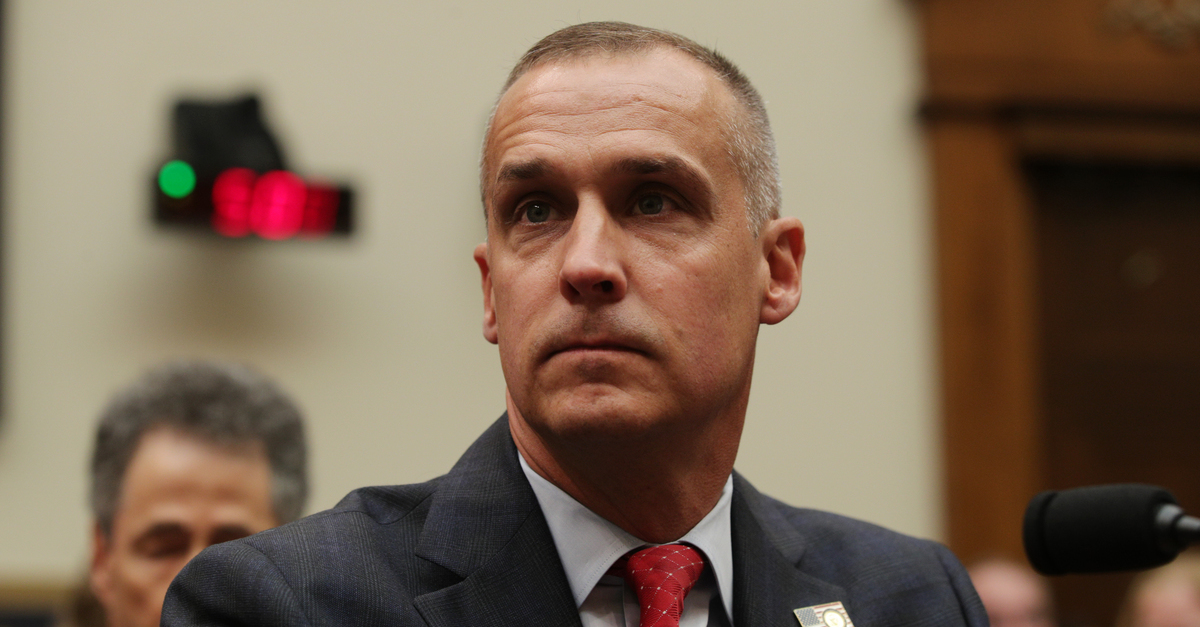
Former Trump 2016 campaign manager Corey Lewandowski appears slated to take a job inside the White House as the administration of President Donald Trump aims to fend off a promised impeachment inquiry emanating from the U.S. House of Representatives. And that role is likely to be substantially powerful and secretive in the extreme.
According to CNN, Lewandowski “has had conversations with White House officials in recent days” regarding his potential reentry into Trumpworld as head of the 45th president’s impeachment war room.
Per that report:
Trump’s 2016 campaign manager would be in a crisis management type role, and the idea as it currently stands would be for Lewandowski to assemble a team that mirrors the one that existed in Bill Clinton‘s White House when he was facing his own impeachment.
Clinton’s impeachment response team featured such figures as attorneys David E. Kendall and Nicole K. Seligman, then-White House counsel Charles F.C. Ruff, then-special counsel to the president Greg Craig, defense attorney Max Stier as well as Emmett Flood in an advisory role. Michael Cohen attorney Lanny Davis and ABC News’s George Stephanopoulos were also key figures in Clinton White House strategy.
Aside from speculation that Trump’s former deputy campaign manager David Bossie may also be joining the fold, it’s a bit too early for additional names since the White House brain trust is reportedly hesitant and conflicted about the need for such an outside team.
So, what might the contours–aside from staffing–of such a mirror-image assemblage under Lewandowski look like?
If Clinton’s legal defense crew is any indication, expect a series of sweeping joint defense agreements. During the so-called “Year of Monica” several White House staff members, attorneys, secretaries and other relevant witnesses were subpoenaed by attorneys for both Paula Jones and by independent counsel Kenneth Starr.
And, during that entire process, Clinton himself knew just about every detail that every witness had told the investigators on all sides of the fight–even during Starr’s extensively-staffed grand jury questioning–because Kendall was “at the hub of an extensive network of lawyers representing other witnesses.”
A Washington Post article from 1998 notes:
Under [the] joint defense agreement, those lawyers have shared with him information about what their clients, including top aides, White House lawyers, secretaries and Oval Office stewards, have told the grand jury. Kendall also obtained details about the testimony of other key players through the back channels of the tightly knit defense bar, including Clinton friend Vernon E. Jordan Jr. and Secret Service officers.
President Trump previously availed himself the utility of the joint defense agreement during the special counsel investigation led by Robert Mueller by somewhat controversially sharing information with Mueller targets Paul Manafort and Jerome Corsi. A separate joint defense agreement between Trump and his former national security adviser Michael Flynn was later ripped up after Flynn agreed to cooperate with the wide-ranging Russiagate inquiry into election interference and alleged obstruction of justice.
Possible defense witnesses during the House’s forthcoming impeachment probe are likely to abound. Attorney General William Barr is already viewed as a potential collaborator on Trump’s alleged “cover-up” of the Ukraine phone call scandal. Barr’s staff would also be relevant witnesses. Then there’s Acting Director of National Intelligence Joseph Maguire–add at least some of his staff into the mix as well. There’s also, of course, the White House staffers and translators who worked on that initial phone call and the memorandum of the call.
In short: House investigators will necessarily be casting a wide net here and Lewandowski–as well as Trump–would probably be privy to a great deal of the information those investigators ultimately gather.
But for Lewandowski the privileges of such a role would also be court-sanctioned with the imprimatur of the U.S. Constitution. Thanks to the Supreme Court, any conversations between Trump and Lewandowski would likely be forever walled off to public view due to the theory of executive privilege. There was some controversy recently when White House counsel Pat Cipollone sent a letter directing Lewandowski, a private citizen who did not serve in the Trump Administration, not to testify about post-election events and conversations he had with President Trump. Cipollone cited “long-settled principles” that exist to protect the “confidentiality interests” of the executive branch.
If or when Lewandowski actually is in the White House fold, though, he will no doubt be shielded by executive privilege.
That theory’s constitutional firmness has an interesting and somewhat relevant pedigree: it’s the result of the Watergate inquiry into Richard Nixon brought by special prosecutors Archibald Cox and Leon Jaworski. The high court basically sealed Nixon’s fate with their decision in United States v. Nixon but affirmed the broader concept and power of executive privilege.
[image via Alex Wong/Getty Images]